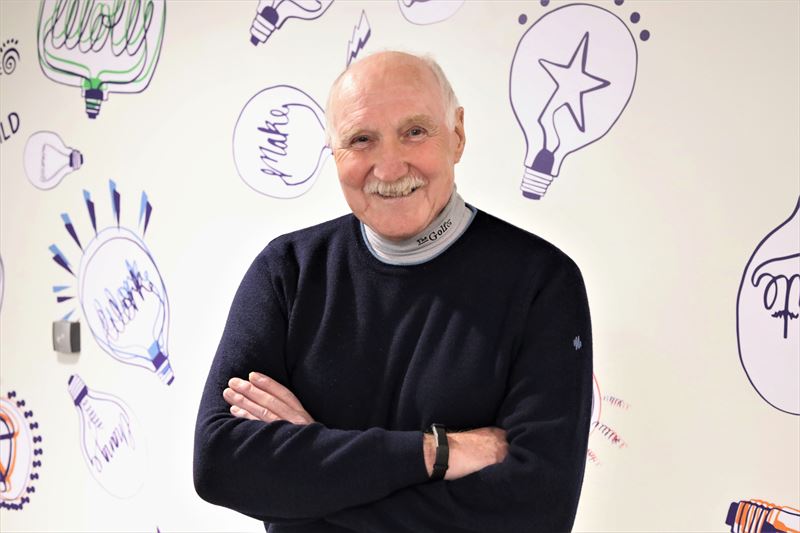Octogenarian inventor joins the fight against COVID-19

A retired engineer from Staffordshire has designed two new methods of sterilising PPE so that it may be safely reused by hospital staff.
82-year-old Derek Wardle, who has vowed he will never retire, recently completed a PhD at Staffordshire University. This marked a hattrick of degrees for the grandfather who also studied Business in 1992 and an MSc Engineering in 2009 at the University.
Derek, from Trentham in Stoke-on-Trent, said: “I thoroughly enjoyed doing the PhD – it opened up a whole new world. If you have the chance, at any age, and you’ve got ambition to get a degree, then come to Staffs University.”Derek is a perpetual inventor and during his PhD he designed a new type of electrostatic precipitator (ESP) – a filtration device which captures harmful particulates from the air before releasing the cleaner air back into the atmosphere.
Last year, Derek decided to hit back at the pandemic and spent much of his time investigating possible ways of sterilising PPE so that it may be reused at least once more. With limited access to facilities during the lockdown, he conducted experiments at home using household items including his wheelie bin and an old tumble dryer! His initial thought was to treat COVID-19 as though it was just another form of pollution which could be captured, contained then destroyed.
He explained: “As soon as coronavirus began and I heard they were using gowns, aprons and visors just the once then throwing them away I thought why don’t I, as a volunteer, try and do something about it.
“Through my work on air conditioning units, I knew the effectiveness of ultraviolet light and ozone in killing bacteria and explored this as a way to destroy coronavirus on PPE in an enclosed space.”
By using a particular wavelength of UV, Derek was able to generate the gas ozone (O3) which could be used to kill traces of the COVID-19 virus before quickly dissipating.
Unable to find a sealable cabinet due to coronavirus restrictions, Derek used his wheelie bin and UV lights to conduct experiments to give him proof of concept. This showed that it is possible to sterilise rigid PPE, such as visors, if stacked in an ozonated enclosure. After lockdown, the test runs were successfully repeated in the laboratory using a purpose-built cabinet.
Derek used the same method to look into sterilising PPE clothing such as gowns, aprons and masks. He commented: “It is difficult for ozone to reach between fibres of stacked cloth but using a domestic tumble dryer was successful in exposing the fibres of the clothing to ozone during tumbling. Tests done in the laboratory later proved that ozone concentrations were sufficient to kill bacteria and destroy viruses.”
Derek’s ambition is to make these methods widely available to sterilise PPE for NHS staff and he is now hoping to work with an independent lab on further testing.
He added: “As an engineer it would be irresponsible of me to assume complete success at this stage. Further tests need to be done by an independent laboratory to ensure the efficacy of the process. In the meantime, nothing more can be done without approved efficacy so hospitals and care homes continue to discard PPE after single use.”
Amy Platts
Media Communications Officer
t: 01782 292702
m: 07799 341911
e: amy.platts@staffs.ac.uk
Staffordshire University is the Connected University; connected to the needs of students, academic partners, business and society. Our main city campus in Stoke-on-Trent features excellent learning and teaching facilities and good transport links. We have specialist Centres of Excellence in Healthcare Education at Stafford and Shrewsbury.
We were recognised with a Gold award in the 2019 Teaching Excellence and Student Outcomes Framework (TEF) for delivering consistently outstanding teaching, learning and outcomes for students.
We have been shortlisted for University of the Year at the THE Awards 2020 and were named ‘Midlands University of the Year’ at the Midlands Business Awards 2020.
Staffordshire University has signed up to the Civic University Agreement, pledging to play a leading role in improving the regional economy and enhancing quality of life in local communities. We were recognised in the top 15 for social inclusion in The Times and Sunday Times Good University Guide 2021. We aim to be a leading university for digital technologies building on our proud computing heritage and in 2019 launched Staffordshire University London’s Digital Institute which is committed to preparing students for careers in new and emerging tech industries.
We are a Top 250 Young University (Times Higher Education Young University Rankings 2020) and are connected globally, with more than 11,000 people studying Staffordshire University degrees overseas.


